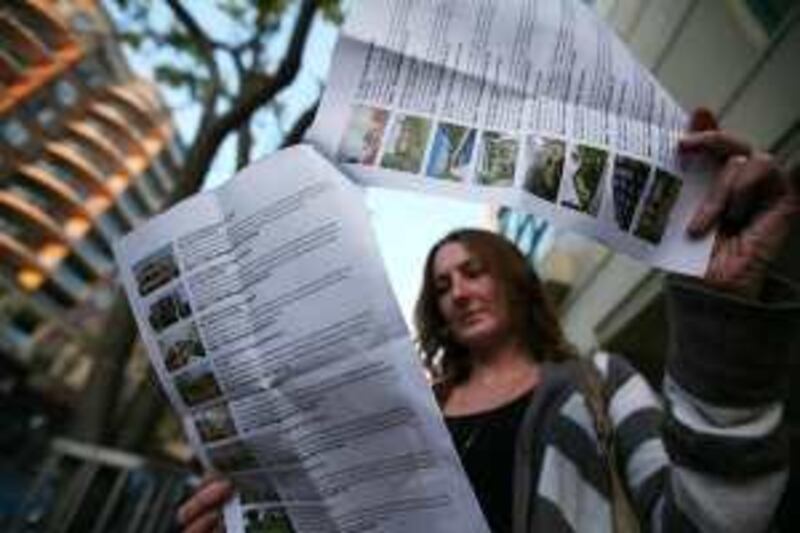SYDNEY // Analysts in Australia say government grants for new homeowners have emerged as a bad-debt "time bomb" for banks. There are concerns that the measures designed to stimulate an ailing housing sector have encouraged an army of mainly younger Australians to take out mortgages they might not be able to afford as unemployment increases - and at a time when interest rates are artificially low.
Cash incentives for first-time buyers were doubled to AU$14,000 (Dh39,524) last October, with payments to those purchasing a newly built property tripling to $21,000. The grants have created a surge of activity at the lower end of the housing market that typically attracts those taking their first steps on the property ladder. Also stirring demand is a heavily discounted cost of borrowing, with the cash rate at three per cent, its lowest level in almost 50 years.
"If you believe that interest rates and unemployment are going to stay low for a long period of time and house prices are going to continue to rise, then it is a great time to buy," said Martin North from Fujitsu Consulting in Sydney, a company that advises businesses. "However, the view that I have is that unemployment will continue to rise in Australia over the next 12 to 18 months, interest rates will start to move up again as we move into the middle of next year and, unfortunately, house prices will begin to slide. Put those three things together and a proportion of those first-time buyers - about 40,000 people - may get in to some difficulty later in the year."
As recently as 12 months ago Australia's housing sector was red-hot and as prices continued to soar, many first-time buyers thought they would never be able to realise their dream of home ownership. The landscape has changed thanks to a combination of factors, including generous government handouts and depressed economic conditions. Byron Rose, the president of the Real Estate Buyers Agents Association of Australia, is worried that many people are being seduced into taking on too much debt.
"My concerns have been that the first homeowners are taking up this grant and are inexperienced property buyers and are being lured in by the grant and therefore creating a demand problem, pushing prices beyond fair market value," he said. "The pain will set in and they don't understand that should they default [on their loans] they will be blacklisted, they could be forced to sell other assets such as shares," Mr Rose warned.
The average house price in Australia is higher than in Britain and the United States but incomes are generally lower. Melbourne properties have a median value of $444,000, while in Sydney the figure has fallen to $529,000. Australia's annual average wage is $60,600. "There is this absolute fixation in Australia about owning your own property," said Mr North. "It is deeply welded into the psyche of Australians."
Approximately a third of Australians own their homes outright, while a similar proportion is either paying off a mortgage or in rental accommodation. Despite a raft of gloomy economic predictions, Aisling Kelly, 33, a cancer care pharmacist in Sydney, is looking to buy her first apartment but is well aware that she may encounter financial difficulties caused by higher interest rates further down the road.
"You need to have a good personal financial plan and think of the worst-case scenario," Ms Kelly said. "The sheer responsibility is scary, but I just want somewhere to call home and don't want to pay someone else's mortgage. I want to get into the market as soon as possible but when you can actually afford it without crippling yourself financially. "So, at the moment I think the time is right and the [homeowners] grant is a great incentive."
Some Australian banks have barely been able to cope with demand for loans from first-time purchasers armed with money from the government but there are calls for borrowers to be carefully vetted to ensure they are likely to be able to meet their repayments. "If the banks are just giving it away because people are coming in with a first homeowners' grant in their pocket, then that will be a recipe for some long-term problems. It is down to the banks to make that judgment about the creditworthiness of those people with that grant," said Patricia Forsyth from the Sydney Chamber of Commerce.
She believes that banks must maintain their strict lending criteria that have protected Australia from the financial carnage experienced elsewhere. "There are lessons to be learned from those subprime loans in the United States and I think our banks are in a remarkably strong position," Mrs Forsyth said. "As a consequence, I don't think our banks will trash their reputations by just giving away the money."
Perhaps wary of the impact its property grants may have in the future, there is strong speculation that the Australian government will scrap or amend its assistance to home buyers at the end of the financial year in June. pmercer@thenational.ae





